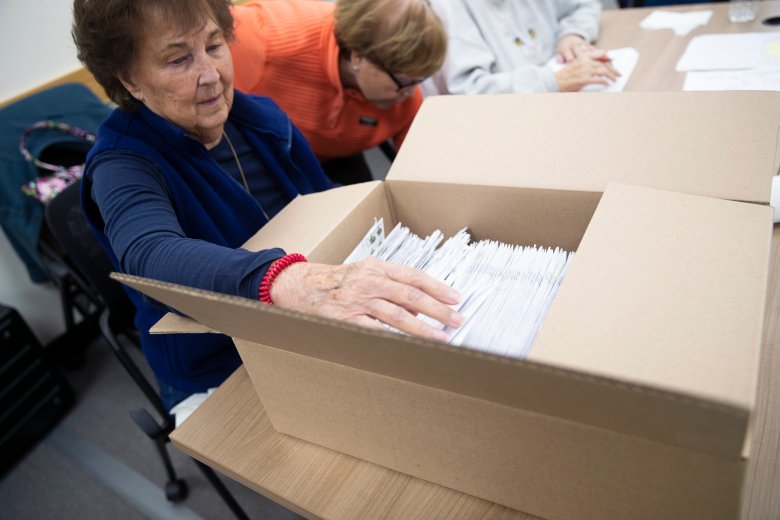Politics
Maine Workers Rally Against Question 1’s Voting Restrictions

In Maine, a proposed ballot measure known as Question 1 raises concerns about absentee voting among the state’s working population. Paul Richardson, a resident of Yarmouth, has consistently participated in elections since 1992. However, his job often takes him away from home on Election Day. For many Mainers like Richardson, absentee voting is essential for ensuring their voices are heard. The upcoming measure threatens to impose new barriers on this vital process.
Question 1, set to appear on the ballot in November 2024, aims to enhance “election integrity.” Critics argue it does the opposite by complicating access to absentee voting. Key provisions of the measure include cutting two days off the absentee voting window, banning prepaid return postage, limiting towns to a single drop box, and ending ongoing absentee status for seniors and voters with disabilities. Additionally, it introduces a photo ID requirement for absentee ballots, complicating the voting process for many.
The implications of these changes could be significant for those who rely on absentee voting, such as working individuals, caregivers, students, deployed service members, and people with disabilities. Richardson emphasizes that each added step could lead to ballots being missed or delayed, particularly for those with demanding schedules.
Research supports the notion that absentee voting is a crucial component of modern elections. According to the MIT Election Data and Science Lab, mail-in voting has tripled since 2000, becoming a mainstream option for American voters. This trend reflects a shift in how elections are administered, aligning with contemporary lifestyles.
Security measures in place for mail voting are robust. This includes signature verification, bipartisan processing, strict chain-of-custody protocols, and ballot tracking systems. Independent reviews from nonpartisan experts highlight these safeguards, confirming that instances of fraud via mail ballots are exceedingly rare. Studies consistently show that cases of mail-in voting fraud are isolated, with some efforts to catalog fraud being criticized for exaggerating the issue.
The performance of the United States Postal Service (USPS) in delivering ballots has also been noteworthy. In 2024, USPS delivered over 99.2 million ballots, with 99.88% reaching election officials within a week. In 2022, nearly 99% of ballots arrived within three days, a standard most private carriers would envy.
Maine residents have shown strong support for absentee voting. In the 2024 elections, the state recorded the second-highest absentee voting totals in recent presidential cycles. This underscores the importance of absentee voting for those with busy lifestyles, long commutes, or seasonal work.
With these facts in mind, one must question what problem Question 1 is attempting to solve in Maine. If the goal is to ensure confidence in the election process, existing measures already provide robust security. If the aim is to increase participation, the proposed changes appear counterproductive, limiting access and adding unnecessary complexity.
Richardson argues that for many working Mainers, absentee voting is not an optional add-on; it is essential for fulfilling their civic duty without sacrificing their livelihoods. He concludes that democracy should adapt to the lives of the people it serves. In his view, Question 1 complicates the voting process without delivering any clear benefits.
As the November vote approaches, Richardson plans to advocate for the protection of absentee voting in Maine, reinforcing the idea that a demanding schedule should not determine whether one’s voice is included in the democratic process.
-

 Science2 weeks ago
Science2 weeks agoIROS 2025 to Showcase Cutting-Edge Robotics Innovations in China
-

 Politics2 weeks ago
Politics2 weeks agoJudge Considers Dismissal of Chelsea Housing Case Citing AI Flaws
-

 World2 weeks ago
World2 weeks agoBravo Company Veterans Honored with Bronze Medals After 56 Years
-

 Lifestyle2 weeks ago
Lifestyle2 weeks agoStone Island’s Logo Worn by Extremists Sparks Brand Dilemma
-

 Health2 weeks ago
Health2 weeks agoStartup Liberate Bio Secures $31 Million for Next-Gen Therapies
-

 Top Stories2 weeks ago
Top Stories2 weeks agoIndonesia Suspends 27,000 Bank Accounts in Online Gambling Crackdown
-

 Sports2 weeks ago
Sports2 weeks agoMel Kiper Jr. Reveals Top 25 Prospects for 2026 NFL Draft
-

 Health2 weeks ago
Health2 weeks agoTop Hyaluronic Acid Serums for Radiant Skin in 2025
-

 World2 weeks ago
World2 weeks agoHoneywell Predicts Record Demand for Business Jets Over Next Decade
-

 Politics2 weeks ago
Politics2 weeks agoNew Jersey Voters Urged to Register Ahead of November Election
-

 Lifestyle2 weeks ago
Lifestyle2 weeks agoMary Morgan Jackson Crowned Little Miss National Peanut Festival 2025
-

 Sports2 weeks ago
Sports2 weeks agoYamamoto’s Mastery Leads Dodgers to 5-1 Victory in NLCS Game 2








